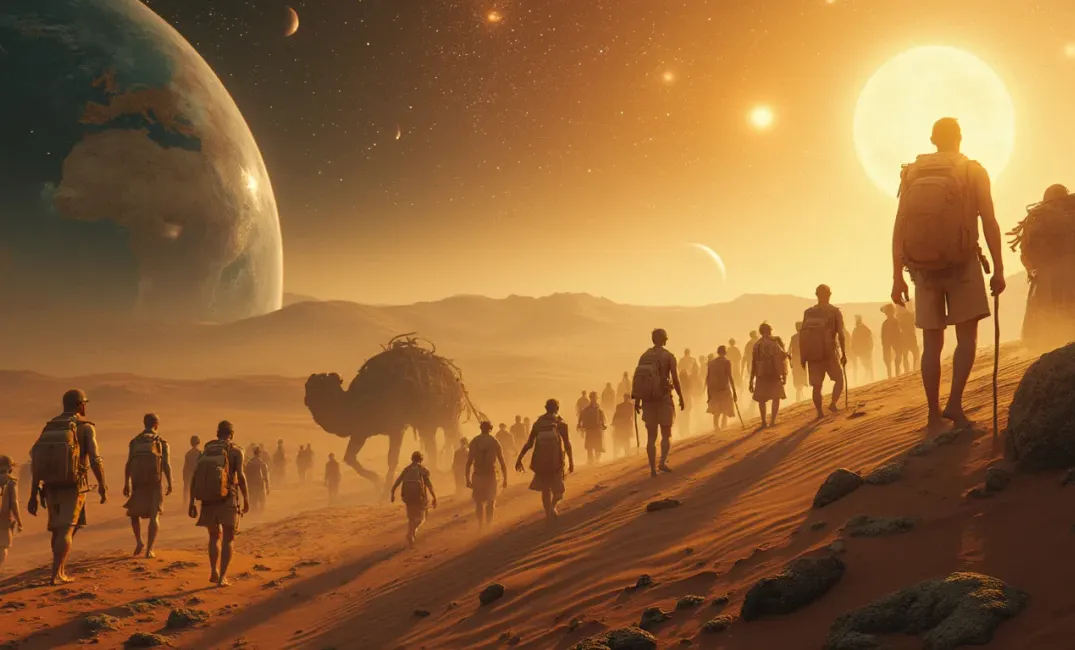Introduction: Movements that Molded Humanity
Human migration is a powerful narrative that has influenced the evolution of societies since the dawn of civilization. Driven by survival, curiosity, conquest, and the pursuit of prosperity, migration is more than a movement from one place to another; it is a tapestry interwoven with stories of exploration, resilience, cultural exchange, and adaptation. This entry illuminates the profound impact of human migration, tracing its historical roots, exploring its role in shaping societies, and contemplating its future trajectories as humanity seeks new beginnings across the stars.
"We are all wanderers on this earth. Our hearts are full of wonder, and our souls are deep with dreams." — Gypsy Proverb
The Dawn of Migration: From Hunter-Gatherers to Settlers
Early Human Movements
- Out of Africa: The journey of Homo sapiens began in Africa, from where early humans embarked on epic voyages across continents. Approximately 60,000 years ago, our ancestors began migrating outward, driven by changing climate conditions and the search for resources. These initial migrations laid the cornerstone for the cultural and genetic mosaic of today's human population.
- Adapting to New Environments: As humans moved into diverse landscapes, they adapted to their surroundings through innovation and social learning. The ability to harness local resources and develop new tools allowed for successful adaptation to varied climates, from the icy expanses of Siberia to the arid deserts of Australia.
Rise of Agricultural Societies
- Agricultural Revolution: The transition to agriculture in the Fertile Crescent around 10,000 BCE marked the beginning of settled societies. This shift led to population growth and, subsequently, further migration as communities sought fertile lands and formed trade connections. The domestication of plants and animals enabled the development of complex societies in regions like Mesopotamia, the Indus Valley, and Mesoamerica.
- Cultural Exchange and Integration: The establishment of agricultural settlements facilitated the exchange of goods, ideas, and cultural practices. Networks of trade routes emerged, connecting distant societies and fostering cultural integration and technological proliferation across regions.
Epochs of Migration: From Empires to Diasporas
Ancient and Medieval Movements
- Empires and Conquest: Empires like those of Rome, China, and the Ottomans expanded through conquest, sparking large-scale migrations. These movements were both voluntary and forced, as people joined military campaigns, settled in new territories, or were enslaved and displaced from their homelands.
- Trade and Maritime Exploration: The Silk Road and the maritime spice trade catalyzed intercultural exchanges, bringing together diverse peoples and facilitating the diffusion of technology, art, and philosophy. Explorers like Ibn Battuta and Marco Polo documented these encounters, revealing the complex networks of trade and migration shaping the medieval world.
Modern Diasporas
- Colonialism and Forced Migration: The age of exploration led to European colonization, resulting in widespread displacement and cultural disintegration for indigenous populations. The transatlantic slave trade forcibly relocated millions of Africans, profoundly impacting societies across the Atlantic and altering global demographics.
- Industrialization and Urbanization: The Industrial Revolution prompted mass migrations towards urban centers, as people sought employment in factories and industries. This urban migration transformed social structures and economies while promoting cultural amalgamation in burgeoning cities.
Migration in the Contemporary World: Challenges and Opportunities
Global Movement and Innovation
- Refugees and Asylum Seekers: Conflicts, environmental disasters, and political instability have spurred significant refugee movements in recent times. As people flee home countries seeking safety and better lives, issues of human rights, integration, and global support become pressing international challenges.
- Digital Nomadism and Virtual Migration: Advances in technology have created new modes of migration, with digital nomads and remote workers challenging traditional notions of migration. These virtual migrations enable professionals to work from anywhere, fostering global collaboration and creative innovation.
Cultural Enrichment and Societal Impact
- Cultural Fusion and Hybridity: Migration enriches societies through cultural fusion and hybridity, fostering a melange of traditions, languages, and cuisines. Cities like New York, London, and Sydney epitomize these multicultural havens, where diversity thrives and new cultural identities are continuously formed.
- Diaspora Communities and Identity: Diaspora communities maintain cultural ties to their homelands while contributing to their host societies. These communities preserve linguistic and cultural heritage while adapting to new environments, creating a dual identity and fostering global connections.
Future Frontiers: Migration Beyond Earth
Interstellar Migrations
- Space Colonization Prospects: As Earth's resources dwindle, the dream of interstellar migration gains traction. Initiatives like SpaceX's Mars colonization plan and international moon station agreements reflect humanity's aspiration to become a multi-planetary species, allowing for new opportunities and challenges in building extraterrestrial societies.
- Cultural Preservation in Colonies: Ensuring the continuity of human culture in space colonies will require careful planning and consideration. Preserving cultural artifacts, languages, and traditions while fostering new identities in alien worlds will be vital to maintaining our rich cultural heritage.
Conclusion: The Enduring Voyage of Humanity
Human migration, in all its forms, represents the indomitable spirit of exploration and resilience. It is a testament to our boundless curiosity, adaptability, and desire to forge new beginnings in the face of uncertainty. As we stand on the precipice of cosmic exploration, migration remains an intrinsic narrative—one woven with both challenges and triumphs across the epochs.
This perpetual voyage holds the promise of unity and progress, inviting us to embrace our shared humanity. In seeking new worlds, it serves as both our history and horizon—a grand odyssey as we continue to rediscover ourselves across time and space.
"Man's real home is not a house, but the Road, and that life itself is a journey to be walked on foot." — Bruce Chatwin
As humanity transcends terrestrial bounds, migration shall guide us towards new constellations of hope, understanding, and possibility.
SPACE COLONIZATION, DIVERSITY, HUMAN HISTORY, CULTURAL EXCHANGE, MIGRATION, ADAPTATION, EXPLORATION

